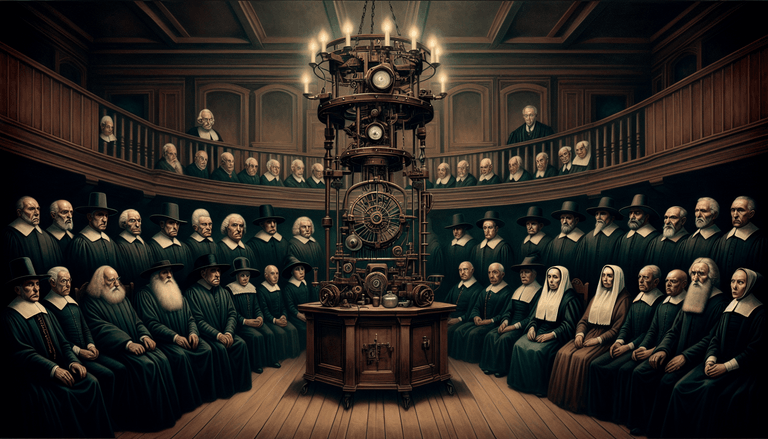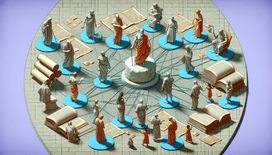Ah, the Salem Witch Trials – a dark spot on the tapestry of history and a testament to humanity's penchant for a jolly good panic. Now, if we had one of those snazzy time travel kits lying around, packed to the brim with modern technology, we'd be tempted to wonder: what would have happened if this grim spectacle had a dose of 21st-century cleverness? Specifically, let's pop a lie detector into the mix and see if we can't prevent a few hangings and some good old-fashioned hysteria.
Picture it now. It's 1692, and Salem, Massachusetts, is abuzz with the chatter of witchcraft and eerie goings-on. The local folk hear whispers that the Reverend's daughter, Betty Parris, and her cousin Abigail Williams, have been sporting some rather curious fits – twitching, babbling, and generally behaving like toddlers who have been deprived of screen time for too long. Naturally, the word "witchcraft" is bandied about with gusto.
The Eleventh Hour Arrival
Enter the miracle of modern tech: the lie detector. Imagine the scene - a bustling courtroom packed full of townsfolk, wigs askew, eyes wide and frothing at the mouth (in polite suspicion, not rabies). As the spectral evidence piles on, the village elders demand truth and nothing but the truth! This is where Mr Lie Detector, a whirring, beeping contraption that looks like a cross between a loom and a bodge-job time machine, takes centre stage. Fancy that, a witch trial turned TV game show, complete with suspense and a chorus of "Ooohs" from the back rows.
Judge Hathorne, who absolutely reeks of mischief and a flair for the dramatic (pre-requisite for witch trials, don’t you know), claps his hands and insists, "We'll hook up these supposed witches and see if the truth sets them free or leaves them dangling like spiced hams from the gallows!" Naturally, this would be accompanied by some ominous organ music, if you please.
Sweaty Palms and Perspiring Pauses
The first to face the lie detector’s steely-eyed sensors is none other than Tituba, the unfortunate slave whose confession opened Pandora's somewhat diabolical box. As the primitive polygraph beeps and lights twinkle like a Christmas tree on crack, the townsfolk hold their collective breath. "Are you a witch?" Hathorne commands, and the entire room leans as if on tenterhooks.
Tituba, spooky and solemn, replies, "No, I am not," with a sincerity to rival a saint. The detector buzzes, gurgles a bit, and then... nothing! Alas, our trusty contraption concurs – she's telling the truth. The room bursts into applause, as if the Patriots just won the Super Bowl (which, for modern Brits, is akin to Henman Hill in full jubilation). Tituba walks free, bewildered yet relieved, dodging the unfortunate fate that history had so unfairly prescribed.
A Riot of Skepticism
Not all would go swimmingly, mind you. Imagine fervour reaching a boiling point as this cartload of anxious villagers start questioning everything. "If Tituba is not a witch, then who?" some would whisper. Ah, villagers discovering doubt – a risky path, no doubt, but a necessary one for them to realise that perhaps their eyes (aided by paranoia) were deceiving them.
Witnesses of good standing, albeit twitchy, would undergo similar interrogations as they are quizzed about various dastardly deeds. "Did you sign the Devil's book?" smirks Hathorne. The lie detector would whirr and hum and occasionally throw in the odd bleep, like a car alarm in the wrong postcode. One by one, as each accuser sputters "No," they too are cleared, much to the chagrin of any self-respecting peasant baying for a burning.
The End of Witch-Hunts, and Lunch is Served
By lunchtime, everyone realises that perhaps, just perhaps, their neighbour isn’t consorting with the Prince of Darkness, but rather just trying to bake a loaf of bread without doom (or gluten, whichever is worse). The local eatery, "Ye Olde Sandwich Stall," reports a sudden boom in mid-morning orders, and the notable absence of village gripes lends to a mostly civil afternoon.
As the days pass, Salem becomes a veritable case study in the art of exoneration. Instead of wallowing in the quagmire of mistrust, the villagers find other pastimes – basket weaving, barn dances, and the occasional pie-eating contest. The lie detector, meanwhile, is reinstated into the town council’s surplus and enshrined as a banner of significant technological prowess and municipal triumph.
So, dear readers, what do we glean from this exercise? The device saved a heap of dignified souls an untimely end, proved that truth, mighty truth, is indeed on Twitter (and truth social), and perhaps most importantly, affirmed that history might have been quite different with a dose of techy ingenuity. Next time someone accuses you of witchcraft, just remember – always call in a lie detector for a little drama and safety net from the witch hunt biz.







